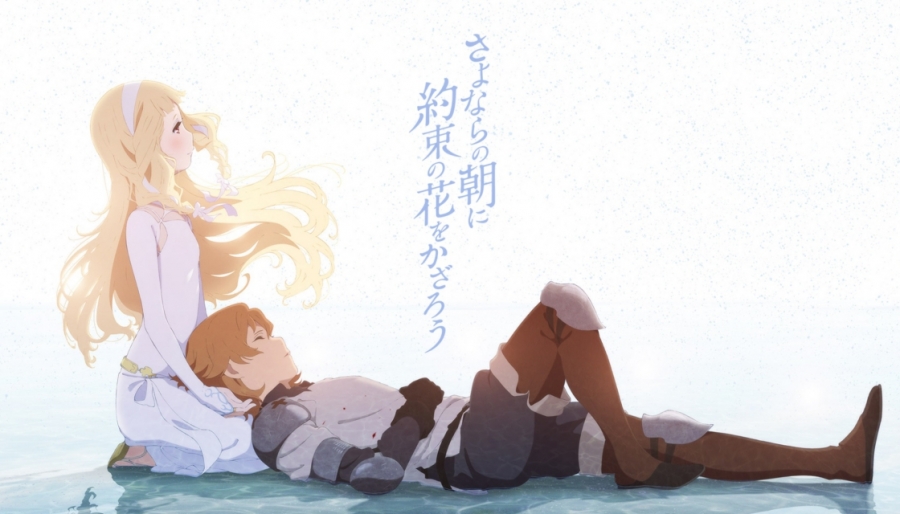To Okada’s credit, Maquia is a story that is unlike any high fantasy I have ever seen. It begins with Maquia, a girl from a clan where they all cease to age in their mid-teens. The Lorph aren’t elves per-se, but between the long golden hair, island domain, and long life spans; a case can be made that they are elves in all but name. However, they lack the pointed ears and Sindarin substitute. Lorph also spend their lives weaving Hibiol, long reams of cloth that tell the saga of their ancestors by means of weaves that only their people can understand. While their lives might be long if left to their peaceful ways, they are not immortal. Maquia is actually orphaned but under the care of the village elder, Racine. Maquia is not without friends, and she spends her days playing with Leilia and Krim. Unfortunately for Maquia, she has feelings for Krim, but Krim only has eyes for Leilia. Also Unfortunately for Maquia’s clan, the Kingdom of Mezarte launches an attack soon after Krim and Leilia confirm their love for one another.
Mezarte is a kingdom of men who also possess dragon-like creatures called Rentaro, but there are some aesthetic differences such as two tails and multiple eyes. Mezarte’s Rentaro Knights are led by Izol who demands to see Racine. It seems that despite their domestication of the Rentaro, there is a disease that is killing them off. It’s called Red-eye, and it strikes at random and causes Rentaro to go mad with feral rage. Mezarte’s king seems to believe that in order to reverse the loss of these magnificent beasts, they need the blood of the Lorph in his bloodline going forward. How Izol’s liege came to that conclusion is anyone’s guess, but nevertheless, Izol and his men are to take Racine and all the Lorph women and escort them to Mezarte.
Things don’t exactly go as planned one Rentaro gets Red-eye and starts attacking everyone. The maddened creature zeroes in on Maquia who ends up being flown off to a far away forest while her home burns. The mad Rentaro dies, but Maquia survives with the remnants of one of the longer Hibiol. She finds the ruins of a camp and a baby being tightly held by a corpse. Maquia takes the child, names him Ariel, and decides to raise him herself. Unfortunately, Maquia does not have a clue on how to be a mom, but fortunately, not everyone in Mezarte is ridden with stupidity and a delusion of intelligence. A farmer named Mido discovers Maquia trying to nurse Ariel on a cow’s udder, and instead of driving them both off, Mido takes them in. Motherhood goes decently well for Maquia even with its fits and starts until a chance encounter with a surviving Lorph brings her back in contact with Krim.
Izol didn’t massacre the Lorph completely it seems. He wrecked the island and scattered the Lorph, but while his mission failed, he improvised his way to succeed. Instead of taking Racine and all the Lorph women back to Mezarte, Izol took the prettiest surviving Lorph girl, Maquia’s friend Leilia, back to his kingdom to be crowned a princess and marry the Prince of Mezarte. I think it was for the best we never actually find out how Izol determined Leilia to be the prettiest nor the fate of those not selected, and at this point in the story, things significantly pick up.
I was very impressed with how this film stayed coherent with all the plotlines going on. Through it all, the story of Maquia and Ariel remained the focus, but not only is the world around them fleshed out, it changes as Ariel matures while Maquia remains in physical stasis. It’s rare to see a writer get directorial duties in anime, but Okada’s continued work with PA Works pays handsomely as the viewer is transported to a fantasy world that undergoes the beginnings of gunpowder and industrialization. There is a little petty kingdom politics tossed in as well, but it was kept simple enough to follow and well executed enough to be a Chekhov's Gun. Given Okada’s record, it should come as no surprise that she can manage twists and turns without tripping over herself.

One can be forgiven for thinking that this would be a romance given the main movie poster, but Okada sidesteps any truly egregious oedipal complications. Instead, we get to bear witness to Maquia’s struggles with motherhood as she goes from raising Ariel to managing his teenage years to ultimately leaving him to grow into adulthood. Only the hardest of hearts will be immune to seeing Maquia and Ariel grow and mature. While Maquia’s attempt at being a mom works largely because she was able to choose and define the terms, Leilia gets short shrifted. Part of it is the lack of screen time, but given how Maquia is still a high fantasy film, there really wasn’t an elegant way to tell the story of a woman getting raped until she was with child, only to be torn away from her newborn daughter, and then lock in a gilded cage as her sanity slips precipitously.
While the Mezarte leadership was cartoonishly bad and incompetent, it also felt sadly human, and for Americans, it may hit too close to home. Bad enough to try and start the “Make Mezarte Great Again” campaign with sexual assault, but to compound it with child separation is rather resonant these days. The conquest of Mezarte was also comically fast, but it was also the result of being friendless and spending most of the budget on a useless but pretty high-walled fortress in an age of mass-produced canons. Sure the palace was tall and impressive, but I am sure the garrison would have preferred to whether the attack on a star fort.
Overall, I liked Maquia and am looking forward to more from Okada as she gets new projects. PA Works once again flexes its considerable animation prowess to bring Okada’s script to life. The end result is a unique, high fantasy setting that western audiences haven’t really seen before. Eleven Arts have scrapped together a short limited release in the US, but if all goes well, there will hopefully be a wider release. The US premiere was well attended at Anime Expo, and audience reaction was good despite the venue being a converted ballroom. Anime fans are in for a treat. Not only are anime movies, in general, making some headway in the US, all but a handful of states in the US will have a screening of Maquia starting July 20th.


